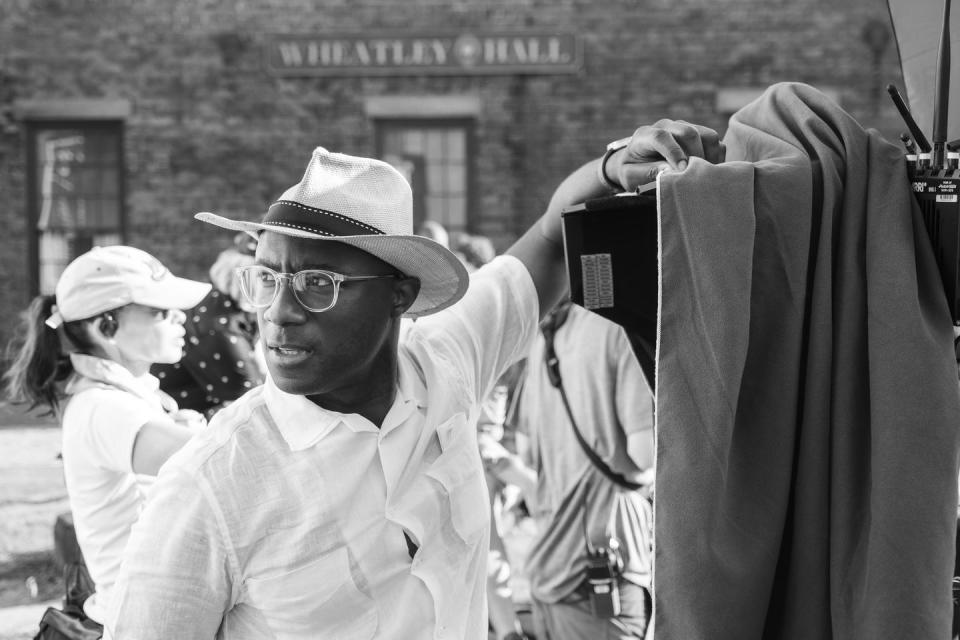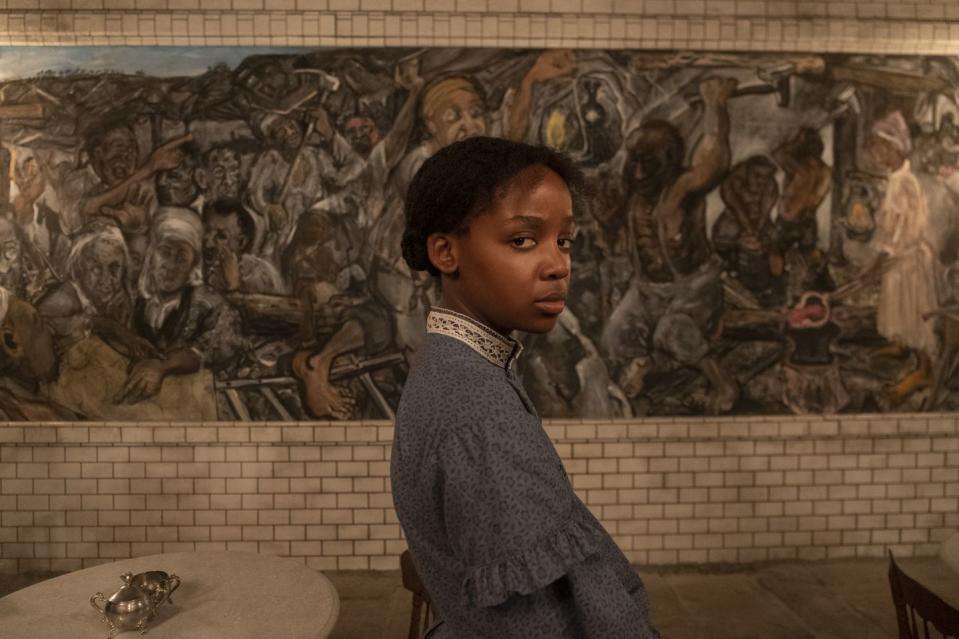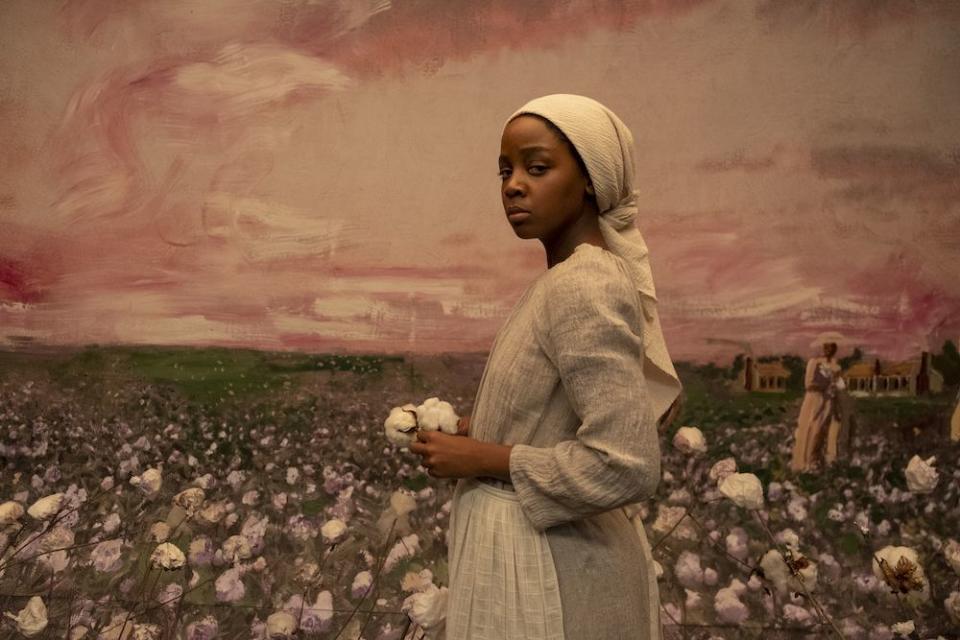Barry Jenkins Tells Oprah He Was "Resplendently Proud" to Make "The Underground Railroad"
- Oops!Something went wrong.Please try again later.
- Oops!Something went wrong.Please try again later.
Long before Barry Jenkins was an Academy Award-winning director, his first job out of film school was at the Oprah-founded Harpo Films, as an assistant director on the set of Their Eyes Were Watching God.
In the years since leaving Harpo at age 25, Jenkins, now 41, has directed the Best Picture-winning Moonlight and If Beale Street Could Talk, based on James Baldwin's novel. Most recently, he directed The Underground Railroad, Amazon's new 10-episode series based on Colson Whitehead's harrowing yet soaring novel of the same name, which was a 2016 Oprah's Book Club pick.

The novel and subsequent adaptation both imagine a version of the United States in which there was an actual underground railroad transporting enslaved people north in the 18th century. When she makes it to a station, Cora Randall (played by Thuso Mbedo in the series) leaves behind a Georgia plantation—and the only life she's ever known.
Though the entire series is available to watch on Amazon now, Jenkins recommends audiences pace themselves. "I’d say watch that first episode and take a beat," Jenkins told Oprah during their conversation about his latest work.
Read on or watch the above video for Oprah's talk with Jenkins about the hardest scene to film, his relationship to his enslaved ancestors, and how The Underground Railroad changed him forever.
I have to say, it's been a long time since Harpo films.
It is a long way, Ms. Winfrey.
So glad that you decided to find your way in the world and seek your own journey.
Thank you, Ms. Winfrey. You were very kind to me. And I’m sure you’ve heard me tell the story about your benefit package.
Yea, the 401k plan!
Yes, ma’am.
$7,000 is not going to get you far. But when you’ve never had it...you need to tell the story.
Well, I was an employee at Harpo films. It was my first job. You were very nice to me. I got to meet Halle Berry. When I was a young man, I felt I needed to do some things. In the two years I’d accrued a 401K because everyone at your company has such great benefits. I cashed it in, I took the 55% and it got me about $7,000. That brought me a yearlong walkabout. I took trains around the country and tried to find myself and figure out what I wanted to do with my life.
Well, you found it.
Thank you.
I’m going to try to get through this without breaking down into prideful tears for you. I don’t know when I’ve been prouder of a human being. What you’ve done with The Underground Railroad, there are no words. You cannot do a thing that you have done, taken Colson Whitehead’s words, which were extraordinary to begin with, and now shape them into such a way that the imagery lives in our spirits. That's what you have done.
It’s so fulfilling to hear you say that. Whenever I create anything, I’m often hoping that that will be the case. It’s not just an intellectual endeavor. It’s not just a craft creation. There’s something spiritual and emotional about it. Walking in the spaces that my ancestors walked and stood, and working with this wonderful crew and cast to embody them—I always try to translate, transmute, transform this thing in here [points to heart] and this thing in here [points to head]. And with this project, I don’t know how it happened, Ms. Winfrey, but I did feel at moments that we had achieved it. That we had translated the essence of our ancestors into the story.

Please call me Oprah, Barry.
It’s hard.
You’re no longer an employee. I do appreciate the respect. When Jonathan Demme and I were doing Beloved in 1997, I remember every single stop I did on the press junket, it was always the Black journalists who’d say, “Tell me why you had to do this. Why do we need another film like this about slavery?” I know someone on Twitter said that, which caused you to pause about whether you’d move forward. What made you move forward?
I felt it was important for me to utilize my language to honor my ancestors in the language that I saw fit. To honor them, it was going to be additive. It was going to add to this conversation about them. It’s interesting: People often assume what they’re going to see when they encounter these images. Hearing the question [on Twitter] reaffirmed that I need to do the work to excavate and understand why I’m creating these images. Somehow the answer has to be encoded into the images. It made me work harder. It made me want to do it even more.
How do you balance trying to capture the brutality with the emotional journey that Cora is on?
It’s difficult to contextualize what it must’ve been like to be our ancestors. Because people are so hesitant to engage with these images, we don’t have the practice to contextualize them. We leave them frozen. We use the word “slave” and then use other words like “enslaved” to freeze them into what was done to them.
It’s clear that the totality of their existence was not just the condition of them being a slave. There had to have been fortitude, hope, love and yearning. And now I get to say this to you. Oprah Winfrey is impossible without love, without community, without fortitude, without all of these things that were present that weren’t able to be squashed, erased, eradicated by the condition of being enslaved. It was important to me in being very forthright. I don’t think we can tell a story about our ancestors without having some aspect of this thing that I felt that they conquered. Not endured.
I come away from Underground Railroad with a firmer understanding of, Look at what we’ve come from. Look at what we are. In spite of everything that happened, look at what we were able to build and give. One of the reasons I wanted to do Beloved is because I wanted people to understand that in spite of everything we endured, we still loved.
That was so important to me in building the show. Especially because I start the show off with a protagonist who feels that she isn’t worthy of love. She’s abandoned by her mom. She feels like she can’t receive love. She goes on a journey—it’s not about vanquishing slavery. It’s about opening herself to the point where she can receive love. She can have regrets. She can make love. By the way, I have to call out that you talk with your fists. I love it. You felt it.
I want your advice about how people should watch it. I had to take a walk, sit outside, regulate myself in a rocking chair. Come back to myself. I think people should measure for themselves how they should take it all in.
I think so too. It’s why my first conversation with Colson, I said, it has to be a series. It can’t be a feature. I knew the very hard images that were at the start of the story. I knew those images and we had to speak forthrightly about them. But there were other soft images that were going to come. These hard images can be so loud. In a two-hour space they can overwhelm the soft images. When [Cora] is in Indiana, it’s resplendent love. Resplendent, unrepentant Blackness and Black joy.
When you are watching, you have control. If you want to pause and fast forward, feel free. I wanted to empower the audience. We were trying to unpack these acts of brutality but not unpack ourselves in creating them. Or certainly the audience in receiving them. We’ve done things to try to allow the audience the space to escape those images if they so choose, or to push past them. I’d say watch that first episode and take a beat.
My friend Ava wears a shirt that says, "I am my ancestors’ wildest dreams." In the making of this show I was standing in a cotton field and I said to myself, There’s no way they could’ve ever imagined or dreamed that I would exist. Then I realized they must’ve. They absolutely did. There’s no doubt about it.
I think they prayed for a better day but I don’t think they ever imagined you or imagined me. I don’t think they could have imagined that.
It’s interesting. I go back and forth on it. I think they did. In the research we did, there are some hard images in the show. It’s nothing compared to the very hard things that were done to our ancestors. We talk about Afrofuturism all the time, and it’s always spaceships and the pyramids taking off. But I think of Afrofuturism as it relates to our ancestors as well. Their bodies were restricted which I think means their minds were so robust. When you dig into spirituals, there are codes and messages for the actual underground railroad in the songs—but I also hear this yearning, this hope, in some of those lyrics and singing. I do.

I never thought of it that way before. Hearing you say that gives me another way to see it. I am my ancestors' dreams. But I never imagined them dreaming a dream as big as you or I. But they must have.
What was so beautiful about making this show is that we had advisors among our background actors. Just like these men reenact Gettysburg, there are Black folks in the South that preserve all of our rituals. Watching them walk around amongst the space and embody the ancestors, there were moments where I'd look at them and the joy that the background actors brought to their performances in the in-between spaces, I’d think, What would they think if they could look Oprah Winfrey in the eyes? This is a glass half full. I believe that they knew, because they saw the specialness among the children they had, there was genius among the enslaved. Unquestionably.
Frederick Douglass.
Exactly. And they’d see if this genius was just allowed to be, it could become Oprah Winfrey. I have no doubt.
OK, Barry Jenkins.
This is why I went from making this show and feeling this heaviness to feeling—my chest began to grow. I didn’t have to work out or nothing. I was so proud to see these people embody our ancestors.

What was the hardest to do?
The hardest was the sequence with Big Anthony. It wasn’t what the audience saw—there was no blood, no fire. The actor Eli Everett was up on a harness. In Eli himself, there was a strength leading up to that moment which is one of the most horrific you could ever recreate. Just standing there.
The sun is setting. There’s a massive mangrove tree, the Spanish moss. It was gorgeous and yet this horrific thing was happening. I knew in my bones that horrific things like this and even worse had happened in this space. It wasn’t what we were doing; it was the fact that what we were doing, there was a truth to it. I walked off. I’d never done anything like that before. I didn’t tell anybody. I just turned and I walked off of my own set. I just stood there in a field for about ten minutes.
The other moment that broke me for other reasons was in the last episode. It was a very simple burial. I tried to stay outside of it with the camera. I didn’t want to interfere with the sacredness of what was going on. One of the actors, not a principal cast member, at the end of his scene got down on his knees and put his head down on the soil and inhaled the earth. I was sitting in my chair and I broke down. It wasn’t sadness. There was something sacred about the space.
A reverence.
A reverence. I’ve always known how beautiful our people are, how worthy our people are. But it was wonderful in the context of a show about this time to create a space where it was so rampantly on display. That broke me even more than the other thing.
This was greenlit in 2016. Did your approach to the telling of it change at all after the cases of police brutality were all over the news?
It didn’t but I think it may have had I made this in a different time. Hearing these words—and I hate to say them, because I think repeating things gives them power—but hearing "Make American Great Again," especially knowing that I was going to live for a year-and-a-half in the state of Georgia, there’s a vacuum, there’s a cavity, there’s a willful ignorance or denial of what America once was and in some ways continues to be. These hard images made me feel like there was a responsibility to speak forthrightly to them. Maybe there was a version where I softened them but I decided not to.
How did this process enhance your life?
I was always proud of my ancestors but it was an intellectual thing. Making this made me so viscerally proud of it. Yesterday I put out this 50-minute thing that I did not have time to make. It’s a series of portraits. We’d pause filming at random. It’s an expensive show and every second is a couple thousand dollars. But it felt so sacred, what we were doing. Especially the commitment of the background actors. I’d stop making the show and just try to capture the essence of these performers embodying our ancestors. I was always proud to be Black and to be the descendent of the enslaved. Making this made me resplendently proud.
I can’t wait for the world to see it. Are you anxious?
I’m always anxious when I make anything, but this one, I’m extremely so. Everyone has their own relationship to these images and to our ancestors. I can’t dictate what that relationship is or how it evolves. I do think I had a duty, honor, and responsibility to them to what I feel is a need to contextualize who they are. But where any individual person is on their journey, I can't say. All I can do is make the offering. I’m going to the desert this weekend. No cell phone reception. No internet. I’m going to sit on the couch and watch the dust roll away and I'll return next week.
You have this way of creating these visceral emotions and this way with silence. You’re not afraid of silence. Is that intentional?
It is. I learned very quickly that people talk, talk, talk, talk, talk and they say, say, say, say, say but if you watch them, they do, do, do, do. As a child, I often watched people to see what it was they were trying to communicate. In the case of cinema too, if you really engage with a character, you might slip into the essence of who that character is. Or you’ll see the actor and that character fuse. Sometimes that requires a little bit of space. It can be hypnotic. One of my favorite shots in this whole show is during the "Clair De Lune" sequence [in episode 9]. The camera booms down onto Cora and you go, What’s about to happen? She’s looking at us and we’re looking at her. There’s no need to look away. She’s a beautiful woman who has taken full possession of herself. I want the audience to live in that. I think building toward those moments and earning them, to me, is the power of telling that story. Colson did a great job telling it on the page. Now the audience has unbroken time to really get inside who this woman is.
Enjoy your desert this weekend.
I'll do my best. I've never gotten to say to you directly, thank you so much. Taking that year around the country due to your wonderful, awesome benefits, it made one of the greatest differences in my life.
Thank you. I take no credit of who you are or what has become the fullest expression and offering to the world but I'm really happy we could've played a teeny, tiny, 401k role in it.
You Might Also Like

